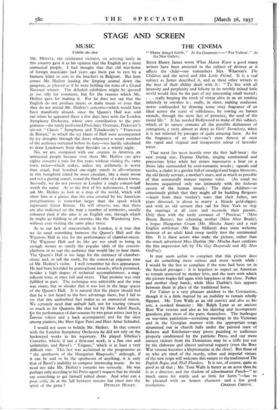THE CINEMA " Three Smart Girls." At the Gaumont—" For
Valour." At the New Gallery.
SINCE Henry James wrote What Maisie Knew a good many writers have been attracted to the subject of divorce as it affects the child—one remembers Mrs. Wharton's The Children and the novel and film Little Friend. It is a real subject as James described it, and as these other writers to the best of their ability dealt with it : " To live with all intensity and perplexity and felicity in its terribly mixed little world would thus be the part of my interesting small mortal ; . . . really keeping the torch of virtue alive in an air tending infinitely to smother it ; really, in short, making confusion worse confounded by drawing some stray fragrance of an ideal across the scent of selfishness, by sowing on barren strands, through the mere fact of presence, the seed of the moral life." It has needed Hollywood to make of this subject, which of its nature contains all the possible darknesses of corruption, a story almost as dewy as Girls' Dormitory, when it is not relieved by passages of quite amusing farce. As for the fragrance of an ideal—one's nose detects at once the vapid and virginal and inexpensive odour of lavender water.
That scent lies most heavily over the first half-hour : the new young star, Deanna Durbin, singing sentimental and precocious lyrics while her sisters manoeuvre a boat on a Swiss lake surrounded by over-romantic woods ; squeals and tussles, a chalet in a garden full of smudged and bogus blossoms, the old family servant, a mother's tears, and as much as possible of that unnaturally mature soprano voice. (As usual we become acquainted only too intimately with the hideous cavern of the human mouth.) The three children—so consciously girlish that they might all be budding Bergners —learn from their mother's tears that their father, ten years divorced, is about to marry a blonde gold-digger, and with an old servant they sail for New York to stop the marriage at all costs and reconcile their parents. Only then with the tardy entrance of " Precious " (Miss Binnie Barnes), her scheming mother (Miss Alice Brady), a bogus Hungarian Count (Mr. Mischa Auer) and a real English nobleman (Mr. Ray Milland) does some welcome humour of an adult kind creep tardily into the sentimental film. It is these actors who make the picture, rather than the much advertised Miss Durbin (Mr. Mischa Auer confirms the fine impression left by The Gay Desperado and My Man Godfrey).
It may seem unfair to complain that this picture does not do something more serious and more worth while : I would be the last to complain if the note had been set in the farcical passages : it is hopeless to expect an American to remain unmoved by mother love, and the tears with which the picture begins fall again with happiness at the close. Father and mother clasp hands, while Miss Durbin's face appears between them in place of the traditional horse.
For Valour is a very pleasant antidote to the Coronation, though it is a little marred by an inability to remain wholly flippant. Mr. Tom Walls as an old convict and also as his son, a crooked financier : Mr. Ralph Lynn as an ancient Boer War veteran and also as his thieving and incompetent grandson, play most of the parts themselves. The burlesque on war-time patriotism—recruiting meetings in the Victorian and in the Georgian manner with the appropriate songs strummed out in church halls under the painted stare of Roberts and Kitchener—may prove puzzling to audiences properly conditioned by the patriotic Press, and our more earnest visitors from the Dominions may be a trifle put out by the elaborate and almost universal roguery (even the Boer War veteran becomes a kleptomaniac at the dose). But those of us who are tired of the sturdy, sober and imperial virtues of the new reign will welcome this return to the tradition of The English Rogue and Moll Flanders. It is not, of course, quite as good as all that ; Mr. Tom Walls is better as an actor than he is as a director, and the shadow of schoolmaster Punch—" so much' cause for mirth and so little for harm "—has to be placated with an honest character and a few good










































 Previous page
Previous page